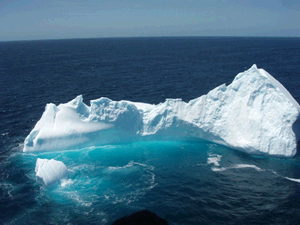Properties of Water

Water is more dense than ice, which is why ice floats on water.
Image from URL: http://www.dynamicscience.com.au/tester/solutions/chemistry/icebrg.gif
Water can exist in any one of three states: solid (ice), liquid (water), and gas (water vapor).
Fresh water has a maximum density at around 4°C: 1 g cm3 (also can be stated as: 1 g ml-1, 1 kg liter-1, 1000 kg m3, or 1 tonne m3).
Water is the only substance where the maximum density does not occur when solidified. In other words, water is more dense than ice, which is why ice floats on water. This unique property of water makes it possible for life to exist below the ice surface on lakes, rivers, and oceans.
Solid water (ice) is the most ordered (least energetic) state of water, while gas is the least ordered (highest energetic) state.